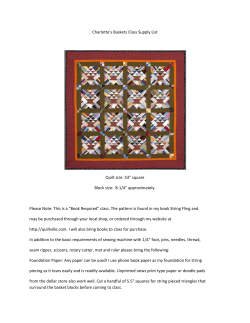
Medial Collateral Ligament Injury Rehab Protocol Mauricio F. Herrera, MD 305-595-1317
Medial Collateral Ligament Injury Rehab Protocol Mauricio F. Herrera, MD 305-595-1317 drsports@me.com www.herrerasportsmedicine.com EMERGENCY MANAGEMENT INCLUDES: A. Protection 1. Protected ambulation – PWB to WBAT 2. Bracing a. Grades I & II – as ordered by physician, full ROM allowed 1) bilateral upright hinge 2) DonJoy/Ortho Tech 3) Lateral knee guard b. Grades II & III – rehab brace with ROM limited –10° to 75° B. Ice C. Compression D. Elevation E. Accurate diagnosis is crucial to rule out associated injury, which may alter treatment plan EARLY POST INJURY PHASE A. Continue bracing as described above B. Continued protected ambulation PWB to WBAT C. Exercise 1. Grades I & II a. Patellar glides & tilts b. Active ROM – to be performed within pain free limits c. ROM in swimming pool/whirlpool d. Isometrics for quad, hams including both PNF and spectrum e. Bike with low seat & low resistance for ROM f. Hamstring/calf stretching in a NWB position g. Resisted hip exercise with weights proximal for abduction and adduction h. Resisted ankle exercise utilizing Theraband or rubber tubing for resistance i. Resisted exercise for upper body and non-involved leg to maintain strength conditioning 2. Grade III a. Patellar glides and tilts b. AROM – 15° to 75° for 4 weeks, then full ROM afterwards c. Isometrics for quads and hams, including PNFs d. Resisted hip exercise with weights proximal for abduction and adduction e. Resisted ankle exercises f. Resisted exercises for non-involved leg and upper body – include single leg biking (noninvolved) EARLY POST INJURY PHASE (Continued) D. Modalities – (prn) 1. Whirlpool 2. Ice (post exercise) 3. Electrical stim for pain and swelling control and/or muscle re-education/strengthening 4. Biofeedback to improve quad control INTERMEDIATE POST INJURY PHASE BEGIN ONCE FULL ROM IS ACHIEVED – GENERALLY 3-6 WEEKS POST INJURY A. Grades I, II, & III 1. Eliminate brace for ADL 2. Progress to full weightbearing without assistive devices increasing distance as tolerated 3. Exercises a. Bike with seat High and low resistance – progress from 5-7 minutes initially to 15-30 minutes b. Flexibility exercises as determined by assessment of patient 1) hams 2) calf 3) quad 4) hip flexors/TFL c. Physiologic knee extension (0° - 45°) 1) leg press (a) supine with sports cord (b) leg press machine 2) mini squats (a) standing isometrics (b) bilateral mini squats (c) unilateral mini squats (d) standing sports cords (e) mini squats with free weights d. Resisted knee flexion e. Resisted hip/ankle exercises f. Proprioception activities 1) single leg support on solid base of support to progressively unstable surfaces (floor to mini tramp) 2) BAPS board 3) Profitter g. Swimming 1) free style (no breast-stroke) 2) functional activities RETURN TO SPORT A. Continue with previous activities to increase flexibility, strength, and muscular and cardiovascular endurance. Emphasis is on reconditioning for return to sport. 2 B. Continue proprioceptive activity progressing as tolerated C. Begin functional strengthening program – sport-specific modified plyometrics program 1. Slow speed to high speed 2. Bilateral to unilateral support 3. Low to moderate heights 4. Soft to hard surfaces RETURN TO SPORT (Continued) D. Functional activities progression 1. Walk/jog (flat track) – start at one-half mile, walk curves and jog straightaway – progress to 2 miles 2. Straight jogging (flat track) – start at one-quarter mile – progress to 2 miles 3. Three-quarter speed running (flat track) – start with 20 yard sprints, doing 4-10 reps 4. Full speed sprinting – 20 yard sprints, doing 4-10 reps 5. Backward jogging – 20 yard jog, doing 4-10 reps 6. Backward three-quarter speed running – 20 yard run, doing 4-10 reps 7. Backward sprint – 20 yard sprint, doing 4-10 reps 8. Lateral slides (defensive drills) one-half to three-quarter to full speed 9. Zigzags one-half speed (soft cuts) – 5 yard increments for 20 yards, progress 2-5 times 10. Zigzags three-quarter speed (soft cuts) – 5 yard increments for 20 yards, progress 2-5 times 11. Zigzags full speed (soft cuts) – 5 yard increments for 20 yards, progress 2-5 times 12. Linebacker drills – one-half, three-quarter and full speed, backward-forward-side-to-side in 10 yard increments, progress 2-5 times 13. Backward zigzags – one-half, three-quarter and full speed, 10 yard increments, progress 2-5 times 14. Figure eight’s – one-half, three-quarter and full speed – progress from large circles to smaller circles then to faster speeds, progress from 5-10 times E. Criteria for return to sport: 1. No signs of active inflammation 2. Full ROM and normal flexibility 3. Isokinetic testing – bilateral comparison of peak torque and work within 85% of non-involved limb and ham to quad ratio of 65% 4. Functional tests a. Vertical jump 1) bilateral 2) unilateral comparison b. Standing broad jump 1) bilateral 2) unilateral comparison 5. Completion of functional progression leading to full participation in sport F. Protective bracing as ordered by physician 1. Lateral knee guards 2. Functional knee braces a. DonJoy – quick and relatively inexpensive b. Ortho Tech – for heavier athletes c. CTI – for small athletes requiring greater mobility MAINTENANCE CONTINUE FLEXIBILITY AND STRENGTH TRAINING 3
© Copyright 2025



















